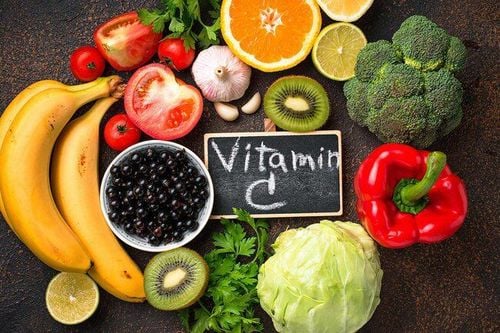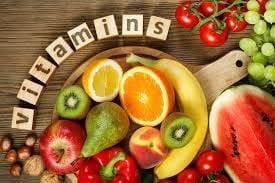This is an automatically translated article.
Vitamins are essential nutrients but the body only needs them in small amounts for a variety of essential processes. The body cannot produce most vitamins on its own, so the body needs to obtain vitamins from the diet. Vitamins are grouped into fat-soluble vitamins and water-soluble vitamins. The need for each vitamin varies with life stages.
1. What are vitamins?
Vitamins are molecules that may be needed in small amounts for a variety of essential processes in the body. They are classified as micronutrients, because they are probably only needed in small amounts, usually a few milligrams (mg) or micrograms (μg) per day. Most vitamins are obtained from foods that provide them and cannot be produced by the body. An exception is vitamin D, which can be synthesized by the body through the action of sunlight on the skin. Or small amounts of niacin (a B vitamin) can be made from the amino acid, tryptophan.
Vitamins have many different functions in the body, including:
Co-factors in enzyme activity Antioxidants (prevents damage caused by free radicals) Pro-hormones (only vitamins) D) If the body does not provide the necessary amount of vitamins due to a poor diet or some medical condition, such as malabsorption or birth defects in metabolism, the body will suffer from dehydration. nutritional deficiencies. Vitamin deficiency diseases are rare in the UK but still occur in some parts of the world.

Các loại vitamin có thể cung cấp cho cơ thể qua chế độ ăn uống
Vitamins are divided into two categories: fat-soluble vitamins and water-soluble vitamins. Originally, vitamins were named with the letters (A, B, C, etc.) but these days are referred to by more commonly occurring proper names, e.g. folate, riboflavin.
Depending on the type of vitamin, the body has different needs, because each vitamin has different functions. These requirements vary according to age, sex and physiological status (eg pregnancy). In addition, the body's vitamin requirements can also be affected by health conditions.
2. How to get the required amount of vitamins?
The best way to get the vitamins, minerals and other nutrients you need is not from the comfort of your local pharmacy, but from food.
A balanced and complete meal plan full of nutrients, including fruits and vegetables, low-fat dairy, plenty of fluids, healthy oils, healthy proteins and whole grains, are the ingredients. indispensable in daily meals.
However, many older adults have difficulty sticking to a healthy diet. There can be many reasons, such as:
Anorexia Difficulty chewing Budget constraints Difficulty finding healthy food In addition, these subjects' bodies are not working as well as they used to prepare or cook nutritious meals. Supplements can be an option as part of the plan your doctor and you need to work to fill in the gaps in your diet.
But supplements are not always right for you. For example, vitamin A supplements are important for healthy eyes, skin, and immune systems. But Vitamin A is a controversial vitamin because users can be toxic when used. Too much vitamin A can cause nausea, headaches, dizziness, and other symptoms. Older people are more likely to get vitamin A poisoning from taking too much because their bodies can't process all of the vitamin.

Nhiều trường hợp có thể sử dụng thực phẩm chức năng để tăng cường vitamin
After talking with your doctor, if you decide you need a multivitamin, purchase a complete supplement that provides 100% of the recommended amount of vitamins and minerals. Be extra careful when you:
Take a lot of supplements Use supplements to replace medicine Take them with over-the-counter or prescription drugs Older adults have different needs for vitamins and minerals matter. For example, the right amount of calcium can help fight osteoporosis in women. Vitamin D, which helps the body absorb and use calcium, also helps prevent bone loss and fractures in older adults.
Sometimes it's hard to know exactly what you need. But if you have a balanced diet, you'll probably be fine. If you're still concerned, nutritionists recommend asking your doctor what supplements might help in your case.
For children to be healthy and develop well, it is necessary to have a nutritious diet in terms of quantity and quality balance. If children are not provided with adequate and balanced nutrients, it will lead to diseases of excess or lack of nutrients, which adversely affect the comprehensive development of children in terms of physical, mental and motor skills.
Children who do not eat properly are at risk of micro-mineral deficiency causing anorexia, growth retardation, malabsorption,... If they notice the above signs, parents should supplement their children with products. The supplement contains lysine, essential micro-minerals and vitamins such as zinc, chromium, selenium, and B vitamins to help fully meet the nutritional needs of children. At the same time, these essential vitamins also support digestion, enhance nutrient absorption, help improve anorexia, and help children eat well.
Parents can learn more:
Signs of zinc deficiency in children
Micronutrient deficiency and failure to gain weight in children
Please regularly visit Vinmec.com website and update useful information to take care of your child. Take care of the baby and the whole family.
Reference source: nutrition.org.u













